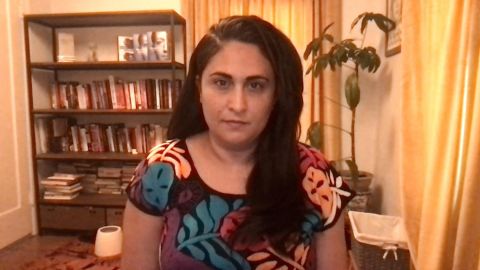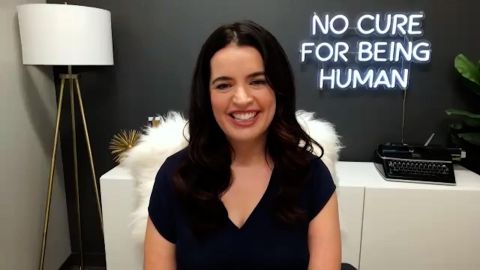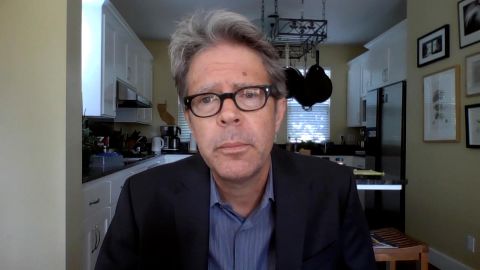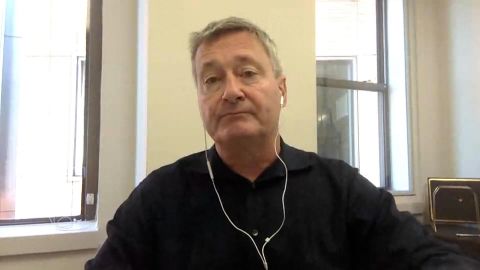Read Transcript EXPAND
BIANNA GOLODRYGA: Well, we turn now to an inspiring example of keeping faith in times of crisis. Duke professor, Kate Bowler’s relationship with God was put to the test when she diagnosed with stage IV cancer at the age of 35. Now, the bestselling author out with a new memoir, “Not Cure for Being Human.” In it she grapples with what she calls the absurdity of the self- help industry and finds comfort instead in our limitations. Here she is speaking to our Michel Martin.
(END VIDEO CLIP)
MICHEL MARTIN: Kate Bowler, thank you so much for being with us again today.
KATE BOWLER, AUTHOR, “NO CURE FOR BEING HUMAN”: I love being with you. This is such a treat.
MARTIN: You know, one of the things I’ve learned from reading your books is, you know, how are you is such a complicated question. It’s such a beknown question but it’s such a complicated question. But I really want to know, how are you?
BOWLER: Well, yes, I guess I think like the crisis of my cancer, I have been dealing with chronic cancer now for six years. The crisis bit is over and now, it’s the sort of — I feel like in the smokey the bear thing where I’m not green or red for forest fires, I’m kind of like yellow or orange sometimes. Right now, I’m a little bit orange, which has been a bit hard.
MARTIN: Oh, I’m sorry. I’m sorry. When we last spoke in 2019, you were describing that being in red place, especially because it was such a shock. I mean, you’re 34 years old and, you know, this isn’t supposed to happen to you.
BOWLER: Yes.
MARTIN: And, you know, you’re at the beginning of kind of the breakout of your career. You’re married. You have a little boy. And, you know, it’s this sort of dealing with the shock of it, at the same time, you’re trying to sort of find meaning in it. Where has this latest book taken you on your journey?
BOWLER: Yes. Yes, because I almost stuck the landing there. I mean, I really almost had like a really shiny life there for a second. And then, there was kind of the bright often beautiful so often terrible clarity of the crisis where, I mean, I was supposed to die that first year. And so, all of a sudden, it felt like the things I really love were in sharp relief. And then, thank God, I kept living. But then it was kind of those, OK, but now what? Like, now, what do I do when I have to redefine my life according to this new chronic uncertainty that I’m experiencing, and I was so afraid of doing it wrong that I immediately just kind of felt the panic of it. Like, in a way, I kind of knew how to have a crisis but I didn’t really know how to live because I’m a historian of self-help and explanations that people give about, like, you know, how to fix your life and I began to sort of really try to think through the common advice and formulas that I was given for actually how to move forward.
MARTIN: Your crisis, and it is a crisis of confronting your mortality, kind of bumped up against your work and your work is kind of investigating our preoccupation with living our best life and you started that as a religious exploration of the prosperity gospel of how there are certain theologies that suggest that if you have enough faith, you will be abundantly rewarded and — including in a material sense. Well, I think this has kind of moved into the secular space now. What do put those two together or what do those two have in common?
BOWLER: Yes. I guess — because at first, I had for almost 10 years studied the history of the idea that good things happen to good people. And then I — you know, I had to confront the limits of those beliefs when — you know, when my life was the one that exploded, when my life was the one that fell apart. A new desire to have like more compassion, frankly, about how suffering people are made to feel like we’re problems to be solved. But I guess I started having kind of similar processes right away as I began to really dive into not just the history of the prosperity gospel but the wider self-help movement, because it turns out that it seems like it’s secular but it’s not secular at all, that it is a massive multibillion dollar industry that is also designed to give you formulas for how to fix your life and that they are predicated on these really unhelpful spiritual beliefs, like that we are invincible and that we’re supposed to be able to outwork, outhustle, sometimes out simplify, Marie Kondo style, out yolo our lives that they’re in all of these formulas was this underlying American, frequently religious belief that we should always be able to move on to good, better, best, even if we’re struggling with something that is often debilitating.
MARTIN: Where did that live your best life thing come from? It’s just a mantra, but all of a sudden, I feel like I see this everywhere. Like where did this come from?
BOWLER: The idea of best life now is a phrase used by a televangelist, Joel Osteen, one of the ones I was studying who coined a phrase in 2004 to describe the belief that God would give you health and wealth and happiness. But it became a kind of shorthand for this wider self-help industry that our minds are incredibly powerful, spiritual forces that can bring things into reality. That’s why, apparently, every peloton class I take is encouraging you to manifest something. And that our inner power, our kind of inner divinity is so strong that the only sins we have is that we fail ourselves, a lot of that comes from our very therapeutic culture in which we end up describing our struggles always as emotional journeys that need to be overcome. The only problem, of course, is that, you know, having lived through a recent earth plague that we know that we are not just a series of choices. The idea that we are self-mastering is, she said lovingly, wildly delusional. It just (INAUDIBLE) but it sells well and it’s so — and it feels empowering at the time in which you’re overwhelmed by something and then, handed a set of tools and strategies, that we accept and absorb to try to fix our lives.
MARTIN: Basically, you feel like we’ve gotten to a point in this culture where we blame people for being sick and by extension, we blame people for being poor and we blame people for not having everything they want. We think it’s gotten to that?
BOWLER: We do. I think that our focus on positivity really has become a tremendous burden and we imagine a hyper agency, like inflated ability of what we can do, we vastly exaggerated the powers of our minds. Hey, sometimes we have negative thoughts and it’s called honesty. It’s called a realistic description of individual and structural inequity. You know, it’s called — I found that just the cultural scripts around being able to say honest things, I mean, honest things would have included, if I were to have just been canvassed on the first few years of my illness, I’m terrified that I’m going to die and leave a two-year-old son whose life will be diminished on me. I mean, like, don’t lie to me and tell me that their lives will be as good if this kid doesn’t have a mom. And hey, it turns out that in this country if you suffer, you’re very likely to struggle with debt and potentially go into medical bankruptcy, and that you will be the thing that happens to everyone you know. And like those kinds of negative sentiments almost impossible to say out loud because of even my own pressure to feel to be the good patient, to be the grateful recipient of care and frankly, I was just embarrassed to have a life that felt unsolvable.
MARTIN: You know, it’s funny. Your book, this one, just like your previous book, has this kind of lovely, funny kind of go down easy kind of tone. But the fact is you are saying some hard things. And one of the things that you’re saying in this book is that you are — you’ve got a doctorate, you are white and, you know, you are very well educated, you’ve got an incredible peer group of friends and family, and you still got medical care that treated you like, I’m sorry, like a diagnosis and not a person.
BOWLER: Yes. I am a densely networked, well-resourced privileged person in my own, in my own university hospital, and I still can’t get humane medical care. I found that to be such an emotional dark lesson about how difficult it is for anybody else who doesn’t have the resources that even I have, who — that it is — that when something takes your life to the ground, that it takes a wild amount of community and a tremendous amount of structural justice to prop any life back up again. And yes, I think that runs counter to this very American story about righteous individuals.
MARTIN: I’m just wondering who you — how — just — I could just take a step back a minute, from your point, how have you seen this whole year and a half as the whole world has dealt with COVID-19? What has struck you as a person who’s been living that challenge in your own way long before?
BOWLER: Cancer really did feel like a dress rehearsal for the kind of, I love the word, the work precarity for this, like that delicate contingent feeling where we’re all hanging by a thread and we’re part of this public health, right, the whole idea that everyone else’s decisions affect our own. It’s been such a terrible and a perfect metaphor for how very outside- in our lives really are. And even if people are — you know, I was so desperate to live my dream and climb that ladder and have the — you know, have the shine my life that I thought that someone who works really hard and was not mean to strangers like should be able to expect, and I have really been grateful to feel like — I’ve tried to let some of that hyper individualism go and I see other people embracing it too. The need that — the knowledge that even when we get a little bandwidth to kind of live our own dreams, we so often have to put all of that on pause and become caregivers in other people’s lives or the recipients of care. So, we’re all really taking turns being the sick one, being the healthy one. And I don’t think I’ve ever seen that as clearly in a communal way as in this last year.
MARTIN: Is there anything that was particularly meaningful to you from this period that you want to hold on to and share?
BOWLER: I guess I have this one — I had this moment when I was driving to the Grand Canyon with my family and I saw this tiny little chapel on the side of the road. And so, I made us immediately pull over and it was this gorgeous little chapel. You walk in and really isn’t actually all that gorgeous at all. It was just sort of slabs of stone and rough wood and I realize that hundreds of people, when they’d stopped, had graffitied all the inside and they were all these spectacular honest prayers like, God, will I ever be the same? Or, Helen, can you hear me? Or God, please help my daughter come home, I miss her so much. And I think part of the fear of living a life of uncertainty is that almost like the loneliness but also the narcissism of it, like you worry you’re the only one. And looking at all these prayers, like all these people yelling into the void, I felt so — I just realized, like, we really are no — we’re not alone in that feeling. In that desperate — the need that life is going to need a lot of courage, but it’s going to also need a lot of hope. And I see that hope every time we press forward with lives that we can’t solve and we can’t add up. So, I think that’s the bit that I want to. Like, I won’t always feel that bright clarity of the crisis. That is something that I can hold on to, is that this will always need courage and it will always need hope.
MARTIN: Do you mind if I ask what you’re teaching your son about who you love so much about what he should strive for and what the future could mean? He’s seven now. And I mean, you’re so grateful to have had, you know, these five years with him that you did not know you would have.
BOWLER: Because it’s like that’s the part of it, right? It’s like, at least, for me, that’s always the heart of it is, for me, it’s my son and I know for people it’s the feeling of being so desperately in love with the people we’re given. And like, I mean, last night, before today, I was so excited to talk to you, I just — these moments are really beautiful for me. And so, I just feel so grateful to have gotten the chance to write that stupid book. And, you know, I just was standing in my son’s room last night just overwhelmed with the weight of how much I’ve already been given that I didn’t think I’d get, but knowing life is always, it’s always uncertain, and like the solution shouldn’t be to try to go back to the way I was before, but when I look at him, that’s all I want, is to be indestructible, to be endless, to be bottomless. You know, and the thing that I have tried, I think, to double down on is like, oh, my dear, we are just going to have these big dumb soft hearts. We are just going to — because he’ll look at me and he’ll say absurdly wise hilarious things like, mom, do you think that people love like us? Like as if he’s just kind of blown away by like — and because I think the right thing to tell him is that the more we love, the more this hurts. Because we’re doing it right. Is because all of this, the weight of it, means that we have accepted the challenge of knowing that every time we love each other more, we’re desperate that we can’t live without each other. That’s how I feel when I look at him. The rest of the day I’m like medium indestructible. You know what I mean? But like that, to me, is the bottom line is that we are given people who we can’t live without. And it is — and I shouldn’t ever imagine life is not something that I can get through without it hurting that good. You know?
MARTIN: Kate Bowler, thank you for your latest book, “No Cure for Being Human.” And I can’t wait to talk to you again.
BOWLER: This was a joy. Thank you. It’s perfection.
About This Episode EXPAND
Gerard Ryle; Sheera Frenkel; Jonathan Franzen; Kate Bowler
LEARN MORE



